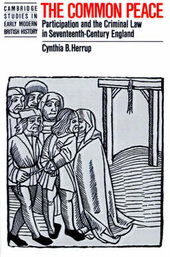
|
The Common Peace: Participation and the Criminal Law in Seventeenth-Century England
Paperback / softback
Main Details
| Title |
The Common Peace: Participation and the Criminal Law in Seventeenth-Century England
|
| Authors and Contributors |
By (author) Cynthia B. Herrup
|
| Series | Cambridge Studies in Early Modern British History |
|---|
| Physical Properties |
| Format:Paperback / softback | | Pages:252 | | Dimensions(mm): Height 229,Width 152 |
|
| Category/Genre | British and Irish History
World history - c 1500 to c 1750 |
|---|
| ISBN/Barcode |
9780521375870
|
| Classifications | Dewey:345.4209 |
|---|
| Audience | | Professional & Vocational | |
|---|
| Illustrations |
Worked examples or Exercises
|
|
Publishing Details |
| Publisher |
Cambridge University Press
|
| Imprint |
Cambridge University Press
|
| Publication Date |
25 August 1989 |
| Publication Country |
United Kingdom
|
Description
The Common Peace traces the attitudes behind the enforcement of the criminal law in early modern England. Focusing on five stages in prosecution (arrest, bail, indictment, conviction and sentencing), the book uses a variety of types of sources - court records, biographical information, state papers, legal commentaries, popular and didactic literature - to reconstruct who actually enforced the criminal law and what values they brought to its enforcement. A close study of the courts in eastern Sussex between 1592 and 1640 allows Dr Herrup to show that an amorphous collection of modest property holders participated actively in the legal process. These yeomen and husbandmen who appeared as victims, constables, witnesses and jurors were as important to the credibility of the law as were the justices and judges. The uses of the law embodied the ideas of these middling men about not only law and order but also religion and good government. By arguing that legal administration was part of the routine agenda of obligation for middling property holders, Dr Herrup shows how the expectations produced by legal activities are important for understanding the decades immediately before the outbreak of the English Civil War. As the first book to use early seventeenth-century legal records outside of Essex, The Common Peace adopts an explicitly comparative framework, attempting to trace the ways that social conditions influenced legal process as well as law enforcement in various counties. By blending social history, legal history and political history, this volume offers a complement to more conventional studies of legal records and of local government.
Reviews'In the richness of its texture and the skill with which the archival materials are handled, the book represents social history at its best.' The Times Literary Supplement ' ... carefully argued and meticulously documented; the central findings and their interpretation are unassailable.' Social History 'Professor Herrup has asked important questions and convincingly answers them ... an important, worthy contribution to the history of crime and criminal justice.' Albion
|